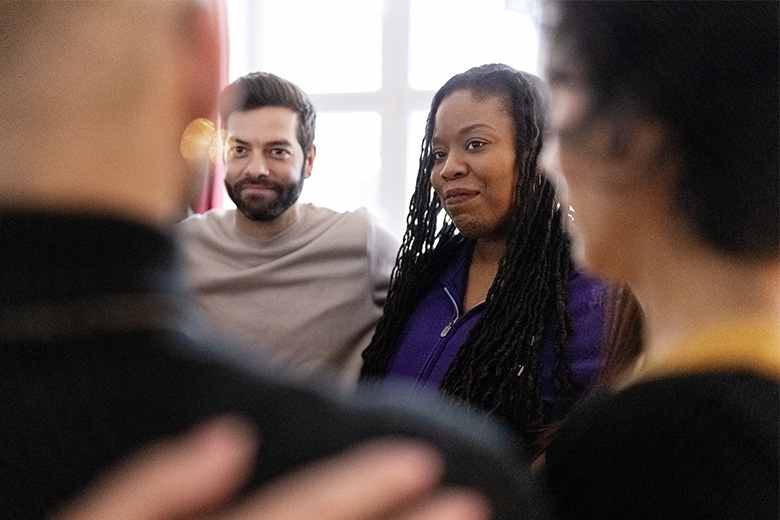Breast Cancer Support Group
Find strength, inspiration and encouragement through others who are also facing a breast cancer diagnosis.
Compassion, caring and advanced treatments to help you heal
A breast cancer diagnosis can be completely unexpected, utterly frightening and emotionally draining. For many people, it also can be confusing. You may not know what the diagnosis means for you or what you should do next. Confusion can create even more stress.
At BID Needham, we understand the challenges faced by those with breast cancer. We also know the difference made by having the right people at your side. That’s why we’ve put together a compassionate team of experts who are experienced in all aspects of breast cancer care. We’ll fight your breast cancer with advanced technology, the most up-to-date therapies and support services that make your cancer journey easier. From diagnosis through treatment and beyond, we’re here for you.

Breast cancer is highly treatable, especially when we find it in its earliest stages. Mammograms are low-dose X-rays of the breast. They’ve been proven to help find breast cancer early, even before you have symptoms. They’re the best screening tool available for women at average risk of developing the disease.
The breast imaging department at our BreastCare Center is accredited by the American College of Radiology. We focus on providing you with the best available imaging care. We offer state-of-the-art digital mammography with highly trained mammography technicians.
In addition to routine screening mammograms, we also offer diagnostic mammograms if an area of concern is identified. Other tests for screening and diagnosis are available if needed, as well. These include:
Our radiologists are highly skilled at interpreting breast imaging results. And we get those results to you as quickly as possible.
If tests reveal a lump or abnormality in your breast, your doctor may want you to have a biopsy. This is the only way to be certain if the area is cancerous. Keep in mind that most biopsies show that cancer is not present.
For a typical biopsy, doctors place a needle through the skin of your breast to remove cells or tissue.
In some cases, we may recommend a surgical biopsy. During this procedure, a surgeon makes a small cut over your skin to access and remove tissue from a suspicious area.
Our breast pathologists examine the tissue from your biopsy to make a diagnosis and help guide treatment decisions. These doctors are on staff at Beth Israel Deaconess Medical Center. That means you get the same world-class expertise you’d find in Boston right here closer to home.
We know waiting for biopsy results can be stressful. We make every effort to share our findings with you as soon as possible.
Breast cancer awareness is key to early detection. Knowing the possible signs of breast cancer may help you get care before your next planned screening if you experience something unusual. Signs and symptoms of breast cancer may include:
These aren’t always related to breast cancer, but it is important to tell your provider about any changes you see or feel in your breasts.
If your biopsy reveals cancer, we have a team of specialists ready to help. It includes breast surgeons, your pathologist and breast radiologists. Medical and radiation oncologists and nurse practitioners are on the team, as well. You meet all of them, and they’re accessible to you and your family. They’re more than willing to address your questions, concerns and fears.
Together as a team, these professionals review your case and agree on the best treatment options for you. Recommendations are based on several factors, such as:
Treatment is personalized based on your unique situation. We always focus on what’s best for you.
Treatment for breast cancer usually involves surgery to remove your tumor. This is considered a local treatment and may involve:
At BID Needham, we use SAVI SCOUT Radar Localization technology to mark your tumor’s location up to 30 days before surgery. It involves placing a reflector that’s about the size of a grain of rice near your tumor. Just before surgery, your surgeon activates the reflector and nonradioactive radar waves detect its location in the breast.
The technique allows for pinpoint precision when removing your tumor. It’s much easier on you than wire localization, which was used in the past. That procedure involved placing a protruding wire in your breast to mark your tumor location. It was often uncomfortable and forced you to restrict movement for hours before surgery.
Lumpectomy is usually followed by radiation therapy to kill any cancer cells that may remain in the area.
Treatment targets the tumor in your breast. But sometimes cancer cells can break away from the original tumor and travel to other parts of your body. There, they can form new tumors. Chemotherapy and hormone therapy act on your entire body. They’re designed to treat any cancer cells that may have escaped from the tumor in your breast. This type of treatment is known as systemic treatment.
At BID Needham, we care for you in body, mind and spirit. Our support and survivorship services are designed to help you cope with cancer. Among other services, they include:
It’s possible to have a gene mutation that increases your risk for breast cancer in the future. Sometimes, this gene may have an impact on your current care, as well. At BID Needham, we offer genetic counseling and testing if your family history suggests you may have one of these mutations.
If you’re at high risk for breast cancer because of personal or family history, we offer a special surveillance clinic.
Your BID Needham cancer care team works with other specialty providers to ensure continuity of care for all your needs.

Find strength, inspiration and encouragement through others who are also facing a breast cancer diagnosis.